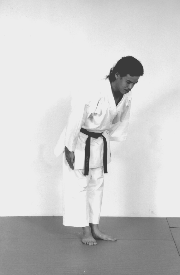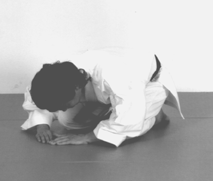 |
Web Dojo an online service of the Nippon Karate-do/Kobudo Seishin-Kan |
 |
| You are here: Home > Dojo Kun > Respect | ||
|
"Everything begins and ends with respect."
Respect cannot be earned; it must be given .....
Respect for others must begin with developing
In simplest terms, respect = caring |
Respect Reigi and Reihō Even people who have never taken a martial arts class know that respect is a big deal in the world of martial arts, and karate-do is no exception to this. If anything, since karate-do is the art of "empty hands" (so we are always carrying its "weapons"), respect may even be more important in karate-do than in other martial arts. It is a key part of our Dojo Kun . . . "One: Always behave with respect and discipline." Or, as it's stated in the JKI Dojo Kun, "One: I respect myself and others." One of the major axioms of martial arts is, "Rei ni hajimari, rei ni owaru," or "Everything begins and ends with respect." So, what exactly is respect, and what makes it so important in martial arts?
Bowing should be an outward gesture that reflects your inner state of mind -- a reflection of the feeling that you have about yourself, your dojo, your sensei, and other people. It should be a manifestation of respect. When we teach children's classes, we often use the word "care" to help them understand what respect really means . . . and it's a simple analogy that is helpful for adults, too. When you respect someone or something, you care about it, you are careful with it, and you take care of it. This is the essence of respect -- caring. One of the most misunderstood facets of respect is the misconception that respect must be earned. Respect must be given whether it is earned or not. If we only show our respect for those who earned it, we would never respect anyone! What standard must a person measure up to in order to "deserve" respect? No one is perfect, so it would have to be a standard that allowed for some degree of imperfection. Then the question becomes, how imperfect will we allow a person to be and still deserve our respect? And which of us flawed human beings is qualified to judge whether another flawed human being deserves respect? Obviously, none of us are qualified for such a task.
In some ways, respect is even the basis for the fighting techniques of karate-do. We bow at the beginning of each encounter to remind ourselves to respect our opponent -- not only in the sense of caring about them, but also to be careful of them. We never turn our back on an opponent; not just out of respect for them as a person, but out of respect for the injury they could cause us if we do. Remaining alert (zanshin) is also based upon this kind of respect for the opponent's abilities. Karate-do employs a wide variety of techniques, some that can kill, some that can maim or disable, some that cause intense pain without serious injury, and some that can immobilize the opponent without pain or injury. Respect for our opponent is one basis upon which we select the appropriate self-defense technique, so that we do not kill, main, or injure an opponent unless it is justified by the seriousness of the the opponent's attack. A fundamental principle of karate-do is "Karate ni sente nashi" or "In karate, never attack first." This precept is also based on respect for one's opponent, as well as having the self-respect to never be the aggressor in a conflict. And the techniques that do kill are designed to do so swiftly, rather than leave an enemy writhing in unnecessary pain for hours. The striking techniques in karate-do are based upon the idea of ichi geki hissatsu -- "kill with one strike." It is an act of unnecessary brutality to batter a person with dozens of blows, as is so often depicted in so-called "martial arts" movies. It not only is despicably inhumane, but such a disgraceful lack of self-control and self-gratification in another person's needless suffering shows an underlying lack of self-respect. So, in karate-do, even a lethal technique is administered as an act of mercy -- according respect to the adversary and preserving his dignity in death. In ancient times, by ensuring that the opponent did not die dishonorably, it was respectful of his surviving family members, as well, since they would not be disgraced by the manner of a relative's death. Even in modern times, it is a comfort to know that a loved one did not suffer in death. This respect for an enemy also prevents us from killing indiscriminately. Furthermore, if we will not take another's life without considering his dignity and the consequences to his family, we also will not place our own life in jeopardy over some trivial offense like being cut off in freeway traffic. Thus, respect acts as a restraining force against wielding our life-and-death power thoughtlessly or without consideration for the consequences -- to ourselves, our family, and our community . . . all of whom we respect. In Flashing Steel, we devote a significant portion of instruction to the development of proper attitudes of respect and dignity, so it is a worthwhile book for karate-ka if for nothing other than its discussion of respect alone. |
|
|
Please give us your opinion of this article.
Was it meaningful to you? Did it help you better understand martial
arts? Did it help you see how martial arts can improve your day-to-day
living? Please give us your comments in our Karate Discussion Forum. |
||
|
Home | Membership | Privacy Policy | Webmaster | Contact Us | Guest Book | JKI Home | Store |
© 2003 Leonard J. Pellman |
|
Free counters provided by Honesty.com.
 The most familiar evidence
of respect in martial arts training is the incessant bowing
we perform. We bow to the dojo as we walk in the door.
We bow to the founder's portrait before we start class. We bow to
sensei. We bow at the conclusion of each set of practice
drills. We bow to each other each time we begin a new set of
exercises. We not only perform the common standing bow (tachi-rei)
as in all other traditional martial arts, but we also use a
seated bow (za-rei) in many circumstances. However,
bowing is more than simply tilting your body forward . . .
The most familiar evidence
of respect in martial arts training is the incessant bowing
we perform. We bow to the dojo as we walk in the door.
We bow to the founder's portrait before we start class. We bow to
sensei. We bow at the conclusion of each set of practice
drills. We bow to each other each time we begin a new set of
exercises. We not only perform the common standing bow (tachi-rei)
as in all other traditional martial arts, but we also use a
seated bow (za-rei) in many circumstances. However,
bowing is more than simply tilting your body forward . . . In karate-do, the
standard is simple: every human being deserves respect.
They may not deserve admiration or devotion, but they do deserve
respect. In karate-do, we even go so far as to respect
our enemies!
In karate-do, the
standard is simple: every human being deserves respect.
They may not deserve admiration or devotion, but they do deserve
respect. In karate-do, we even go so far as to respect
our enemies!